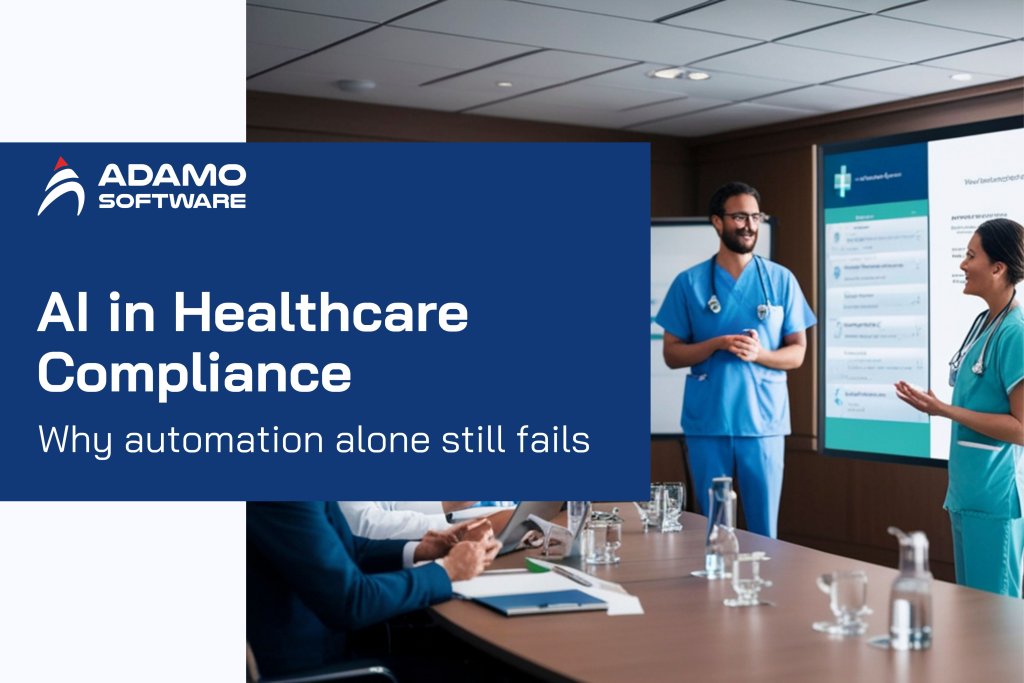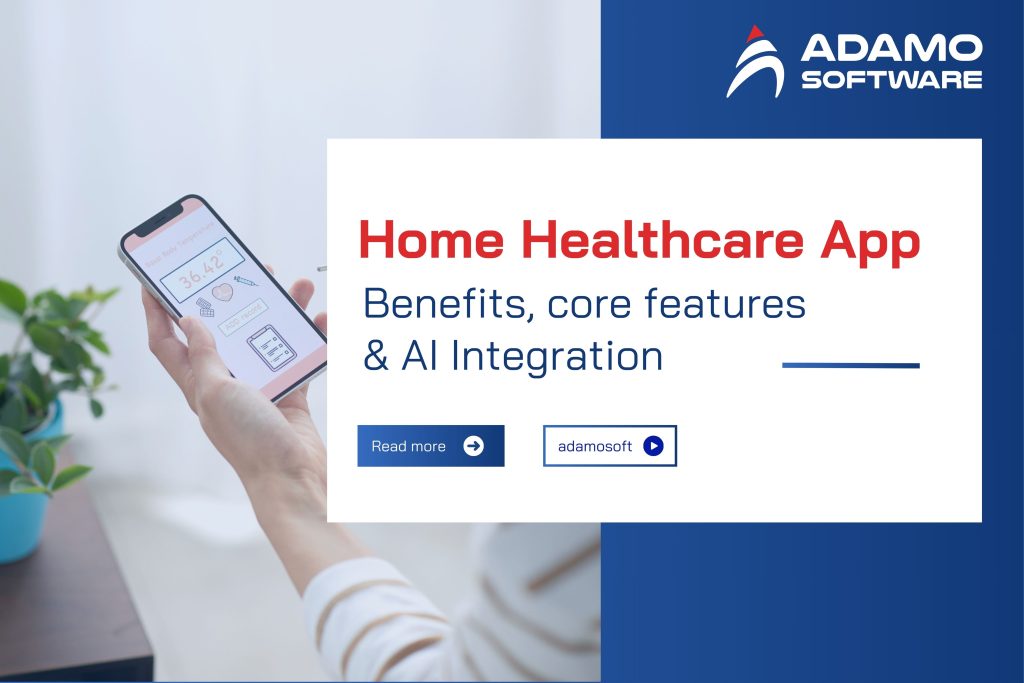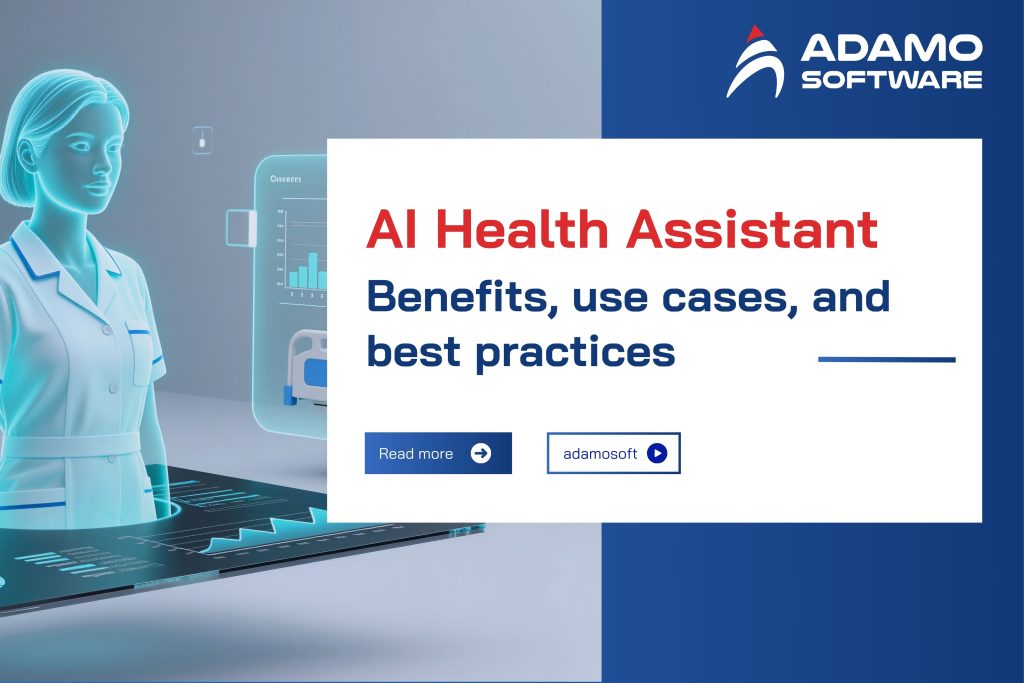Top 15+ EMR Integration Solutions in 2026 for healthcare industry
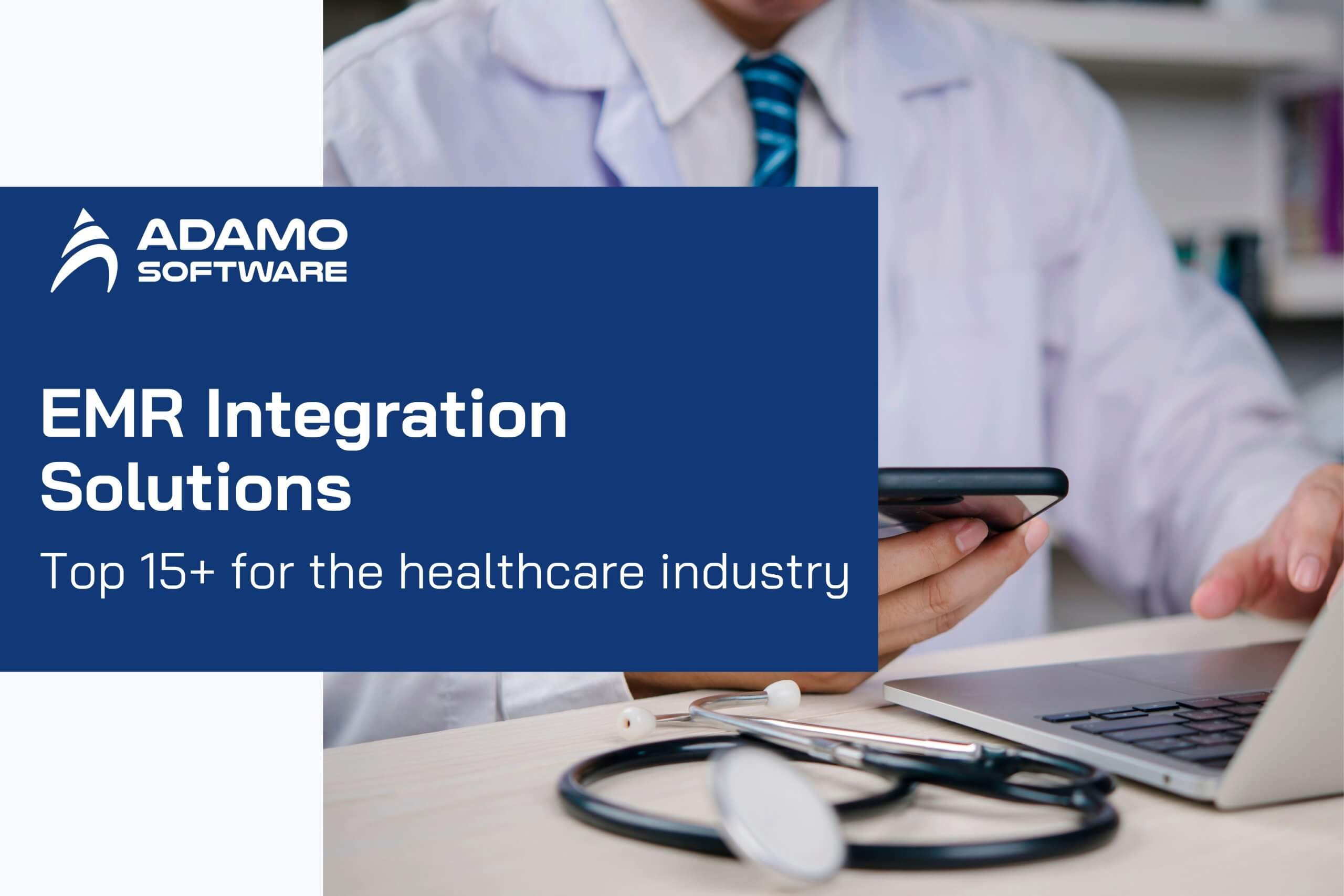
Currently, electronic medical records (EMR) are indispensable in the healthcare industry. With the ERM systems, medical centers can store and manage all patient information digitally. These pieces of information include data such as name, address, medical history, prescriptions, patient test results, etc. Thanks to the EMR systems, healthcare facilities can optimize patient records management and improve the quality of care. Let Adamo Software recommend the best EMR integration solutions for the healthcare industry.
Through this blog post, you will find detailed information about the key advantages of ERM integration solutions and the reasons why you should choose custom EMR integration tools. Besides, this blog post also discusses skills that EMR software developers need and the top EMR integration solutions for the healthcare industry. All information is updated according to trends and carefully researched. Let’s read our post for an overview of EMR in the medical field.
I. Key advantages of EMR integration solutions
EMR integration solutions bring many benefits to healthcare institutions. EMR in healthcare can replace paper medical records, which allows healthcare providers to find patient information. Besides optimizing the working process, EMR-integrated solutions also improve the accuracy and security of information. Below are some of the main advantages of EMR integration solutions.
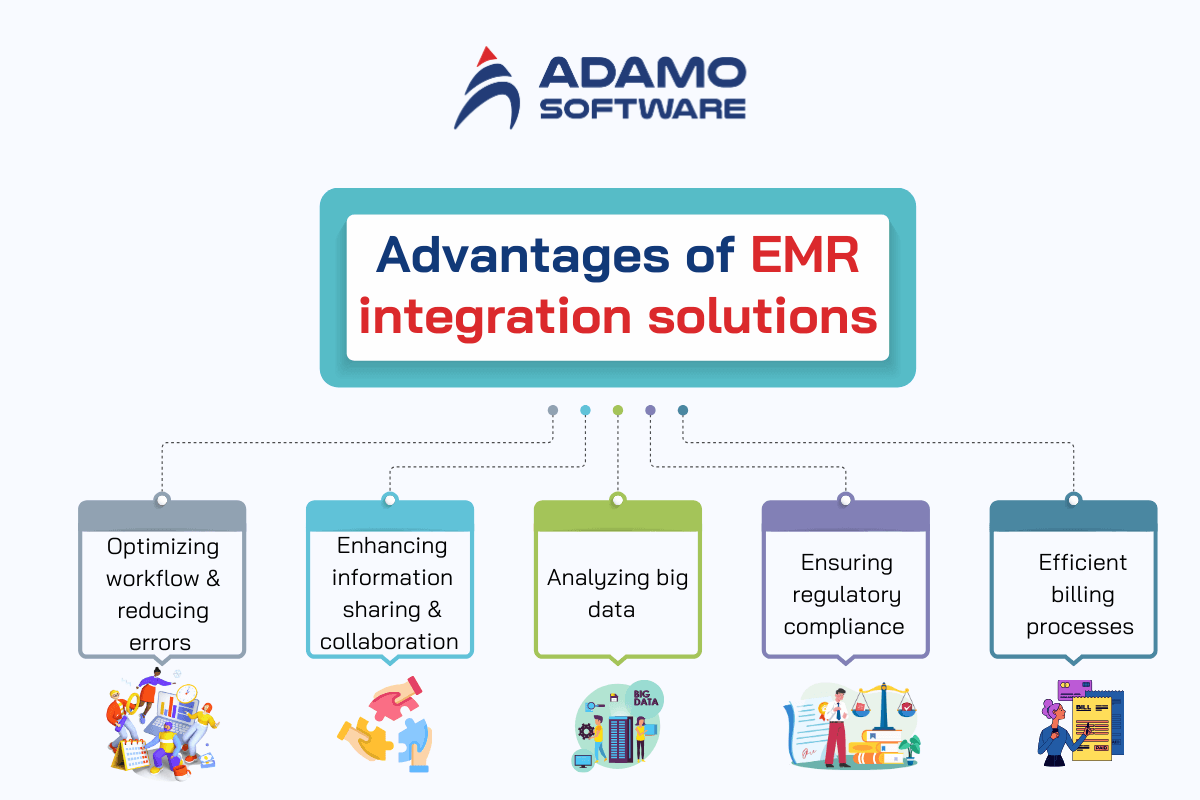
1. Optimizing workflow and reducing errors
Medical centers do not need to enter data thanks to the EMR integration solutions manually. This helps them to reduce the time spent on administrative tasks. The automated EMR system enables medical staff to enter and retrieve information quickly, improving work efficiency. This is especially useful in large medical facilities where there are a large number of patients and records.
Besides, by automatically storing and retrieving patient records, medical providers can significantly reduce errors associated with manual data entry. Additionally, healthcare providers will no longer be worried about the loss or destruction of paper records. This allows physicians and healthcare professionals to quickly and accurately access patient records, leading to better treatment decisions.
2. Enhancing information sharing and collaboration
EMR integration solutions help to enhance information sharing and collaboration not only between different departments within a hospital but also between different health facilities. This creates a continuous and effective healthcare system for patients. EMRs allow doctors and medical staff to access patient information immediately without paper document transfers. Thanks to this, the treatment process can be accelerated, especially in emergencies.
In addition, EMRs provide real-time data, which enables doctors to easily communicate with each other about patient conditions and adjust treatment plans flexibly. This helps to improve treatment quality and reduce medical errors.
In case the patient must be transferred to another hospital, EMRs can also be of great help. With EMR integration solutions, medical records can be seamlessly transferred, minimizing the possibility of missing or incorrect information. Thanks to this, the patient’s treatment process will not be interrupted, especially in cases that require long-term follow-up or complex treatment.
3. Analyzing big data
EMR integration solutions help medical facilities analyze big data which includes different types of data, such as Excel sheets, webpages, images, videos, audio files, etc. Thanks to these analytics, medical professionals can make accurate clinical decisions and enhance the quality of treatment. Let’s explore how EMRs help with big data analytics with Adamo Software!
- Collecting and storing big data
EMRs help to collect and store large volumes of medical data from various sources. They include diagnoses, treatments, test results, medical histories, and patient personal information. Data stored in the EMR systems can be used to analyze trends, identify disease patterns, and evaluate the effectiveness of treatments.
- Predicting disease progression
One of the advantages of EMR integration solutions is the ability to analyze historical data to predict disease progression. Analytic tools are integrated into EMRs, allowing doctors to identify early signs of complications, disease risks, or factors that affect the patient’s condition.
- Supporting evidence-based decision-making
By aggregating and analyzing data, EMRs provide physicians with valuable information to make clinical decisions based on specific evidence. This helps increase objectivity and accuracy in the treatment process, thereby improving the quality of patient care.
4. Ensuring regulatory compliance
EMR integration solutions can assist healthcare organizations in complying with medical regulations and standards. Thanks to these solutions, all medical care activities are carried out following laws and industry requirements.
Healthcare facilities must ensure the security of patient personal information. EMRs can help them with this. These systems are often designed to comply with strict security and privacy standards. For example, some outstanding standards include the Health Insurance Portability and Accountability Act, General Data Protection Regulation, etc. With data encryption, access authorization, and activity tracking, EMR systems help ensure that patient information is only accessed by authorized personnel. This prevents data leaks or breaches.
5. Efficient billing processes
With EMR integration solutions, medical centers can optimize the management and processing of transactions related to medical examination and treatment costs. This process includes several key steps that help reduce errors, speed up processing, and ensure transparency in billing for patients and stakeholders.
EMRs integrate a payment management system that tracks and processes payments from patients automatically. This eliminates the need for manual tracking, minimizing late payments or lost information.
In general, EMR integration solutions help healthcare facilities operate more efficiently and improve patient care quality and satisfaction. This is an essential tool in modernizing the healthcare sector and ensuring a sustainable future.
II. Why should you choose custom EMR integration tools?
EMR integration tools bring many benefits to healthcare facilities. However, not every medical center has the same solution. Choosing customized tools helps each of them meet specific needs and optimize operational efficiency. Let Adamo Software discuss some reasons why you should choose custom ERM integration tools.
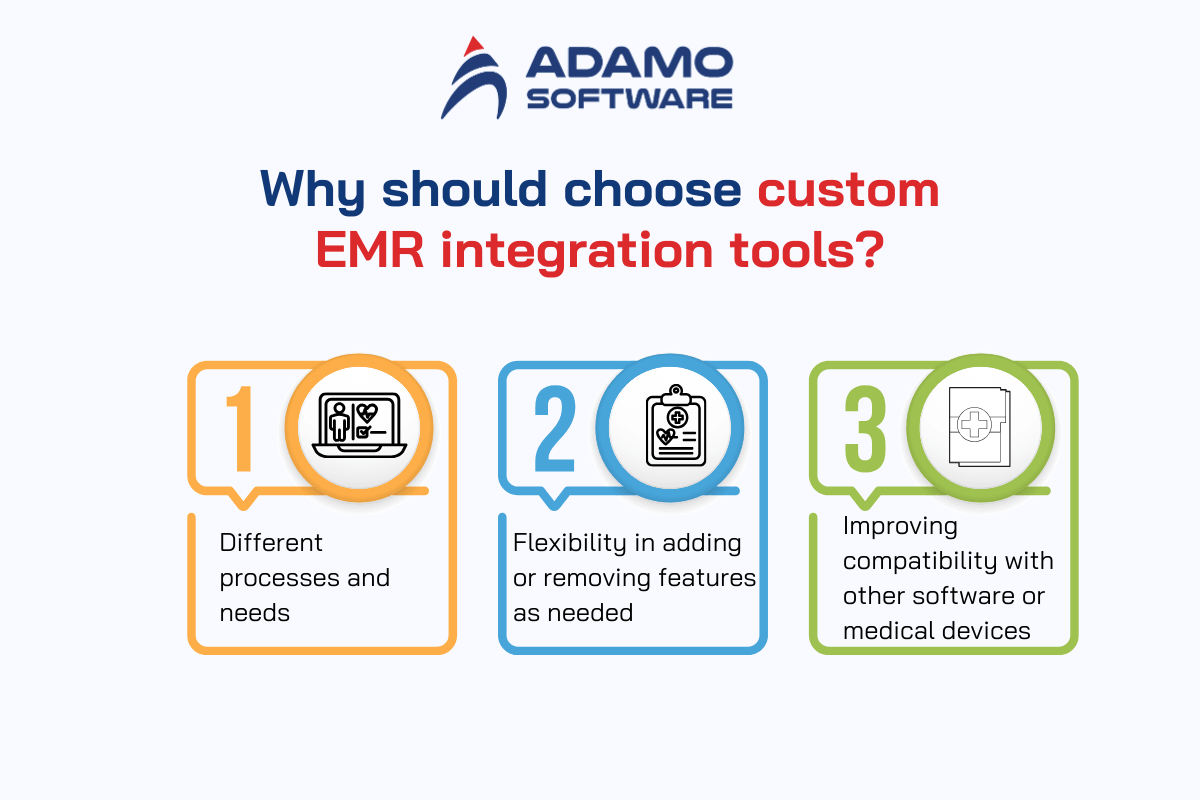
1. Different processes and needs
Custom EMR integration solutions are necessary because different healthcare organizations have different unique processes and needs. The structure, workflow, and patient management approach of every clinic are unique in size, expertise, and development orientation. Customized tools ensure maximum compliance and efficiency of the healthcare providers.
2. Flexibility in adding or removing features as needed
Custom EMR integration solutions allow hospitals to add or remove features based on their needs. With a custom-built solution, you can easily add the features you need, such as data analytics tools, appointment management, or e-prescribing support. This flexibility helps optimize costs and reduce wasting resources on unnecessary features.
3. Improving compatibility with other software or medical devices the facility is using
The next reason is that tailored EMR integration solutions help to improve compatibility with other software or medical devices that you are using for your medical center. The integration ensures that data from other medical devices or software can be automatically entered into the EMR system without manual processing. For example, test results from laboratory machines can be automatically saved to the EMRs so that doctors and medical staff can easily access them. This makes workflows more efficient, reduces duplication, and ensures the integrity of medical data.
III. Important Skills to Consider When Hiring EMR Software Developers
Software developers for EMR integration solutions must have technical skills and soft skills to build and maintain the complex EMR system. Let’s find some important skills to consider when hiring EMR software developers with us!
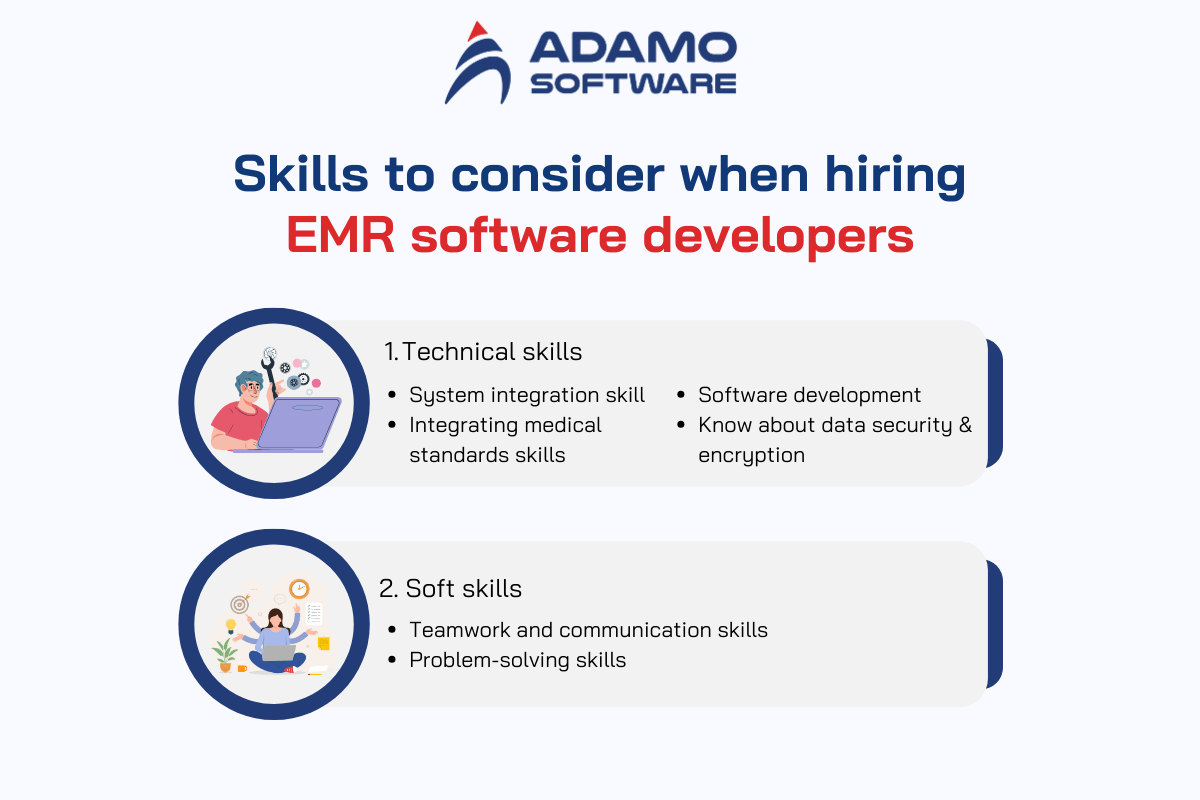
1. Technical skills
Technical skills are indispensable for EMR software developers in developing electronic medical records management systems effectively. These skills help to ensure the compatibility and security of the system and optimize the performance and scalability of EMR integration solutions. Here are some technical skills that they need.
- System integration skill
EMR software developers must have system integration skills. This ensures that EMR integration solutions can effectively connect with other healthcare systems and devices. They can be insurance management systems, laboratory equipment, medical picture archiving systems, etc. This integration and compatibility help to make the workflow at healthcare facilities smoother.
- Integrating medical standards skills
EMR software developers must have integrating medical standards skills. These skills enable them to ensure the harmonious integration of the system and healthcare facilities.
Some standards like HL7 (Health Level 7) and FHIR (Fast Healthcare Interoperability Resources) are used to share patient data efficiently and securely. In addition, healthcare facilities use DICOM to integrate medical imaging data such as X-rays and MRIs. This ensures that diagnostic imaging results can be easily accessed and used in medical facilities.
- Programming and software development
Programming and software development skills are undoubtedly among the skills that EMR software developers need. They must know popular languages in healthcare software development such as Java, C#, Python, and SQL.
- Know about data security and encryption
EMR software developers must know about data security and encryption to develop the best EMR integration solutions. They must understand security protocols and methods. They are SSL/TLS for data encryption, OAuth, JWT for access management, patient information protection, and security standards to ensure the system complies with legal regulations on information security.
2. Soft skills
Besides technical skills, soft skills are also essential for EMR software developers. These skills support them in working efficiently and achieving the best results. Here are two outstanding soft skills they need.
- Teamwork and communication skills
When developing EMR integration solutions, developers must collaborate with multiple stakeholders. They are healthcare professionals, IT professionals, and administrators. Therefore, they must have teamwork and communication skills to ensure the system is built to specifications and operates effectively.
- Problem-solving skills
When developing the integrated EMR software, errors and challenges can appear. Thus, developers must have problem-solving skills to keep the system running smoothly and not disrupt the medical process.
IV. Top EMR integration solutions for 2026
Choosing a suitable integrated EMR solution will help improve the healthcare quality and efficiency of healthcare facilities. Below are some prestige EMR integration solutions that help you manage patient records and workflows effectively.
1. Epic Systems
Epic Systems is among the top EMR integrated solutions that are suitable for large healthcare organizations. This system provides a comprehensive management function, from managing patient health records, and appointments, to clinical data analysis. Enhancing patient care, improving workflow, supporting rehabilitation, and integrating comprehensive behavioral health are some key benefits of this system. High implementation costs and long training times are disadvantages of Epic Systems.
2. NextGen Healthcare
NextGen Healthcare is among the EMR integration solutions for small and medium clinics. The system supports the integration of clinical, financial, and insurance data, helping manage aspects of the healthcare process. Below are some outstanding advantages of the system.
- Specialized templates allow customization to fit your practice’s unique needs
- Mobile flexibility enables providers to work remotely
- Enhanced interoperability
- Improved patient engagement
The system is highly regarded for its customization features. However, it can require extensive training. This can be quite costly for small medical centers.
3. Cerner
Cerner is also one of the widely used EMR integration solutions that provide good integration with various healthcare systems. This system can store and access patient records quickly. Additionally, Cerner also provides data analysis tools to support clinical decision-making. Due to its popularity in large health systems, it often requires a high investment cost. However, its modular design and extensive features can make it challenging to learn and navigate.
4. Allscripts
Allscripts is a popular integrated EMR solution, suitable for small and middle-sized clinics. The system provides comprehensive healthcare management. The outstanding features of Allscripts include managing patient appointments, storing and accessing medical records electronically, prescribing medications digitally, providing patient self-service portals, etc. The system faces technical challenges, limited customization, and data migration issues.
5. eClinicalWorks
eClinicalWorks is one of the ideal EMR integration solutions for small practices. This system provides comprehensive patient record management features, including appointment management, medical record management, and diagnostic support. The system includes telehealth features, allowing for virtual consultations with patients and improving access to care. eClinicalWorks’ interface may take some getting used to.
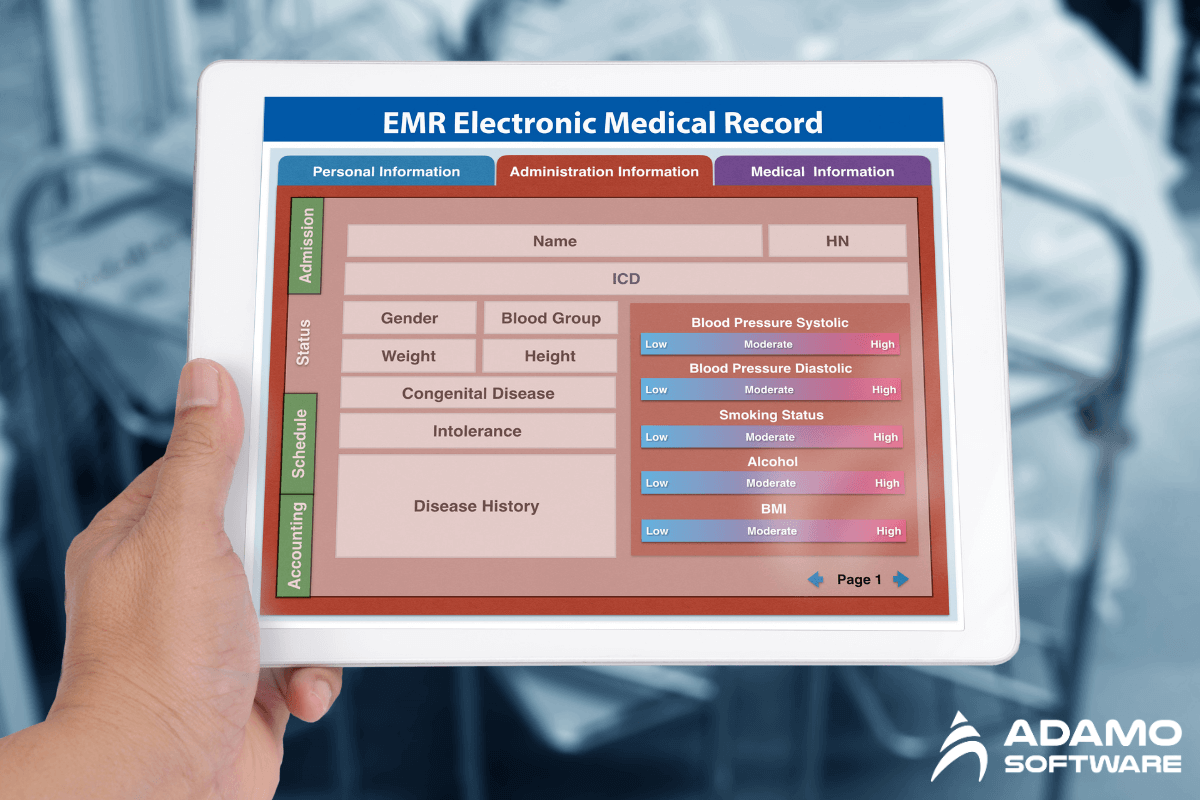
6. Athenahealth
Athenahealth is among the cloud-based EMR integration solutions that healthcare facilities may consider using. Thanks to cloud-based integration, healthcare providers can access and manage patient information anytime, anywhere. This system offers clinical decision support features based on real-time patient data analysis. Automatic updates and data security are Athenahealth’s strengths. Besides, the system also has efficient documentation, seamless data sharing, and expanded care options. However, the high implementation costs can be the downside to Athenahealth.
7. Meditech
Meditech is also a popular EMR integration solution in hospitals and medical institutions. This system offers a wide range of patient information management features, from electronic records, and clinical data management to billing and financial management. Below are some notable features of Meditech.
- Advanced EMR features
- Treatment recommendations
- Data exchange solutions
- Claims processing
Despite the benefits, the system faces many technical challenges. They are complex integration with third-party applications, system slowdowns, occasional glitches and downtime, and limited charting options.
8. Practice Fusion
Practice Fusion is also among the ideal choices of EMR integration solutions for small healthcare facilities. This system provides basic patient information management functions, integrated with payment and appointment management. It is outstanding with its flexibility and ease of use, allowing clinics to quickly implement and get familiar with the system. However, Practice Fusion is not suitable for large-scale hospitals due to its limited features and lack of scalability.
9. AdvancedMD
AdvancedMD is a powerful EMR system that offers comprehensive features for managing patient records, appointments, and billing processes. It is especially suitable for large or specialty clinics, thanks to its ability to integrate well with financial and insurance tools. AdvancedMD also offers clinical data analytics and decision support tools to help physicians improve the quality of care. However, the cost of implementation and maintenance can be quite high. Besides, the system also faces data migration challenges.
10. Greenway Health
Greenway Health is among the flexible EMR integration solutions suitable for small and middle-sized clinics. This system supports patient records management, appointment scheduling, and billing. It is quite easy to use with clear reports and dashboards. However, Greenway Health may face technical issues such as connecting with other systems, redundant data entry, updates that are hard to manage, etc.
11. DrChrono
DrChrono is also a choice of EMR integration solutions. Healthcare facilities like to use this system thanks to its user-friendly interface and ability to integrate with mobile devices. This allows physicians to access patient data anytime, anywhere. The system also supports high customization, suitable for the needs of many types of medical facilities.
12. Kareo
Kareo is one of the outstanding EMR integration solutions that streamline medical centers with a user-friendly platform. This system focuses on patient records management, appointment scheduling, and billing, helping clinics optimize their daily workflow. Besides, this system also provides powerful integration with financial and insurance management systems. However, Kareo may lack some of the complex features that large organizations require.
13. ScriptSure
ScripSure is among the EMR integration solutions developed mainly for electronic prescription management. This system helps automate the prescribing process, from selecting drugs and dosages to sending prescriptions directly to pharmacies. ScriptSure stands out for its user-friendly interface and good integration with other healthcare systems, helping to reduce prescribing errors and improve user experience.
14. CareCloud
CareCloud is also among the cloud-based EMR integration solutions that can be useful for healthcare facilities. It offers detailed patient summaries, customizable templates, actionable insights, progress tracking for quality initiatives, telehealth integration, and easy appointment scheduling with drag-and-drop functionality. With its cloud-based platform, CareCloud minimizes the initial investment costs of medical centers.
15. TherapyNotes
TherapyNotes is a specialized EMR system for therapists and mental health professionals, focusing on patient record management and clinical workflow support. The system offers features such as clinical notes, appointment management, and billing, helping mental health professionals manage their work efficiently. The system’s interface is designed to suit the specific needs of the therapy industry, from recording therapy notes to managing long-term treatment plans. Despite the advantages, TherapyNotes has limited functionality with simple reporting.
16. CureMD
CureMD is a cloud-based EMR solution that offers a full suite of electronic medical records, appointment scheduling, and billing features. The system is easy to use and suitable for small and medium-sized medical facilities.
V. Adamo Software – A reliable provider of EMR-integrated solutions
Are you finding a reliable company to help you with your EMR integration solutions? If yes, Adamo Software may be your ideal choice. As a top leader in providing digital health solutions, we are confident that we can meet your requirements and expectations. With an experienced team, Adamo focuses on developing customized electronic medical record management systems. We can ensure that the EMRs have high flexibility and integration with your existing healthcare systems. Adamo’s solutions help automate healthcare processes and enhance information sharing, data security, and compliance with international medical standards. Here’s how we can help you in developing integrated EMR solutions.
- Customizing solutions to specific needs
- Ensuring that different systems can exchange data efficiently, minimizing errors and increasing work efficiency
- Ensuring compliance with standards and regulations
- Providing data analysis tools
- Deployment support and training

Don’t hesitate to contact our Adamo Software team now to tailor your EMR integration solutions.



